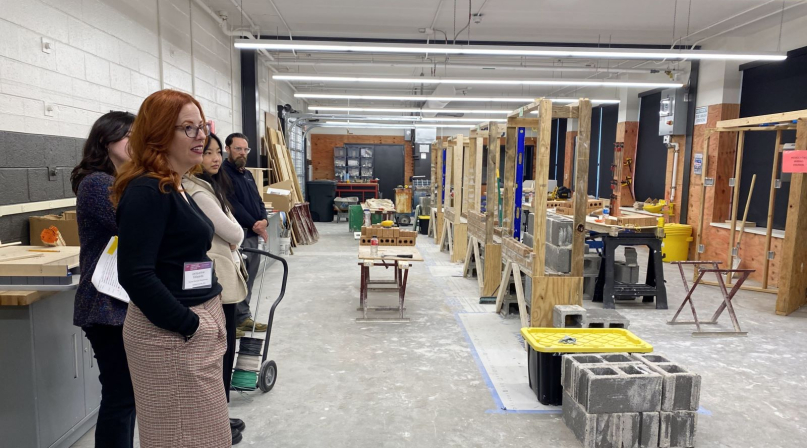County promotes productivity for incarcerated in jail

Key Takeaways
Across the U.S., county jails are often seen as short-term holding facilities for individuals serving sentences or awaiting trial. However, in Tennessee, some individuals can be incarcerated for up to 11 months and 29 days, or for “11 29s.” Over the last year, Hamilton County, Tenn. leaders have reimagined this population’s time in jail with a re-entry program that promotes productivity, increases higher education attainment and reduces recidivism.
Amid the pandemic-driven closure of a private, for-profit prison and its subsequent $20 million renovation to transition the 500 individuals from the downtown jail to a larger facility, Hamilton County Sheriff’s Office (HCSO) Project Manager Scott Michiels saw an opportunity to enhance the jail’s re-entry program. Increasing vocational technical (vo-tech) education access drove the transformation. Vo-tech was a new addition to the existing “soft skills” program and is relatively rare in county jails.
“Re-entry has been in prisons forever. They can get college degrees and certificates because they got plenty of time,” Michiels explained. “[In jail], their time is limited. [But], we want to be able to impact these people and make it possible for them to get gainful employment, a living wage, something they can start a career with.”
HCSO considered a variety of training providers, but eventually settled on the Tennessee College of Applied Technology (TCAT) at Chattanooga State Community College to provide credentials in the breadth of industries that Michiels envisioned for programming at the jail.
In 2022, the Hamilton County Jail and Detention Center kicked off its first cohort for a cosmetology program — TCAT provides the curriculum and HCSO supplies the books and cosmetology learning kit. By the end of their 11 29 sentences, enrollees will have made approximately 200 hours of progress toward an industry-recognized credential and make an easy transition, as already-enrolled students to on-campus classes at Chattanooga State.
While initial support for the jail’s cosmetology program came from the State of Tennessee and philanthropic grant funding, Michiels said county investments were transformative. With the donation of jail-adjacent county buildings and some county funds, Hamilton County plans to expand its vo-tech program beyond jail walls to the carpentry, electrical and welding industries. County funds and resources have made this process not only possible, but also smoother. While grant funding often requires a narrow focus and stringent reporting, “it’s easier to get things done” with county dollars and partnerships, Michiels said.
County Mayor Weston Wamp is a strong proponent for the addition of vocational education. “Investing in our jail re-entry program has the potential to change lives, save tax dollars and lower crime by reducing recidivism,” he said. “The work is not easy, but we believe that if we get re-entry right, it may be the best possible return on investment of local tax dollars.”
The program’s outlook got a boost when Michiels shared its story with county officials representing post-secondary education, workforce development and human services from across the nation during NACo’s Counties for Career Success (C4CS) peer exchange in November in Hamilton County. It was there he learned the TCAT students in the jail would be eligible for need-based assistance through the Pell Grant program, stretching existing funding further to include more individuals on 11 29s. Long term, the program’s impact on recidivism rates pays for itself by reducing costs of reincarceration for the county.
At any scale, post-secondary education programs in county jails offer the 95% of individuals in jail who will return to the community an opportunity to achieve their full potential.
Related News

Congress reauthorizes Economic Development Administration for first time in 20 years
The agreement, for the first time in 20 years, would reauthorize the Economic Development Administration (EDA).

Counties Applaud Passage of WRDA/EDA Package
Omnibus package will advance county interests in economic development, water infrastructure

County Countdown – December 16, 2024
Every other week, NACo's County Countdown reviews top federal policy advocacy items with an eye towards counties and the intergovernmental partnership.
Featured Initiative
Counties for Career Success
The Counties for Career Success (C4CS) initiative supported counties in enhancing pathways to education and employment. The 2023-2024 C4CS cohort received technical assistance, expert guidance and peer learning opportunities to develop cross-sector plans that improve job access and learning opportunities for residents.

